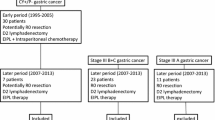Abstract
Background
Positive peritoneal washing cytology (PWC) has been reported to be a poor prognostic factor for gastric cancer. Japanese gastric cancer classifications recommend PWC in Douglas’ pouch for advanced gastric cancer. However, the sensitivity of PWC is relatively low. The goal of this study was to investigate whether PWC in multiple cavities increases its sensitivity to predict prognosis.
Methods
Between January 1996 and December 2006, a series of 992 patients with gastric cancer underwent D2 gastrectomy with intraoperative PWC. Of the 992 patients, 62 patients had positive PWC. PWC was conducted in four cavities (left subphrenic cavity, right subhepatic cavity, Douglas’ pouch, and inside the omental bursa). The 62 patients were retrospectively analyzed for their background and survival.
Results
Eleven (17.7%) patients had negative PWC in Douglas’ pouch but were positive in the other cavities. The 62 patients were classified into two groups according to the number of positive PWC cavities: 20 patients with one or two and 42 patients with three or four positive PWC cavities. No significant difference in clinicopathological features was observed between these two groups. However, the overall and progression-free survival rates of patients with one or two positive PWC cavities were significantly higher than those for patients with three or more positive PWC cavities.
Conclusion
PWC in multiple cavities was more sensitive than only in one cavity. The number of positive cavities may indicate the grade of tumor spread in the peritoneum and predict the prognosis of patients with positive PWC.


Similar content being viewed by others
References
Maruyama K, Kaminishi M, Hayashi K, et al. Gastric cancer treated in 1991 in Japan: data analysis of nationwide registry. Gastric Cancer. 2006;9(2):51–66.
Kodera Y, Yamamura Y, Shimizu Y, et al. Peritoneal washing cytology: prognostic value of positive findings in patients with gastric carcinoma undergoing a potentially curative resection. J Surg Oncol. 1999;72(2):60−4 (discussion 64–5).
Japanese Gastric Cancer A. Japanese classification of gastric carcinoma—2nd English edition. Gastric Cancer. 1998;1(1):10–24.
Cetin B, Atalay C, Aslan S, et al. Peritoneal carcinoembryonic antigen level for predicting locoregional and distant spread of gastric cancer. Surg Today. 2005;35(11):919–24.
Bando E, Yonemura Y, Takeshita Y, et al. Intraoperative lavage for cytological examination in 1,297 patients with gastric carcinoma. Am J Surg. 1999;178(3):256–62.
Kodera Y. Disseminated cancer cells in the peritoneal cavity: what can we do when we detect them? Gastric Cancer. 2008;11(4):192–3.
Li JK, Zheng M, Miao CW, et al. Peritoneal lavage cytology and carcinoembryonic antigen determination in predicting peritoneal metastasis and prognosis of gastric cancer. World J Gastroenterol. 2005;11(46):7374–7.
Wu CC, Chen JT, Chang MC, et al. Optimal surgical strategy for potentially curable serosa-involved gastric carcinoma with intraperitoneal free cancer cells. J Am Coll Surg. 1997;184(6):611–7.
Suzuki T, Ochiai T, Hayashi H, et al. Peritoneal lavage cytology findings as prognostic factor for gastric cancer. Semin Surg Oncol. 1999;17(2):103–7.
Bonenkamp JJ, Songun I, Hermans J, van de Velde CJ. Prognostic value of positive cytology findings from abdominal washings in patients with gastric cancer. Br J Surg. 1996;83(5):672–4.
Fujiwara Y, Doki Y, Taniguchi H, et al. Genetic detection of free cancer cells in the peritoneal cavity of the patient with gastric cancer: present status and future perspectives. Gastric Cancer. 2007;10(4):197–204.
Singletary SE, Greene FL, Sobin LH. Classification of isolated tumor cells: clarification of the 6th edition of the American Joint Committee on Cancer staging manual. Cancer. 2003;98(12):2740–1.
Sakuramoto S, Sasako M, Yamaguchi T, et al. Adjuvant chemotherapy for gastric cancer with S-1, an oral fluoropyrimidine. N Engl J Med. 2007;357(18):1810–20.
Moriguchi S, Maehara Y, Korenaga D, et al. Risk factors which predict pattern of recurrence after curative surgery for patients with advanced gastric cancer. Surg Oncol. 1992;1(5):341–6.
Kodera Y, Nakanishi H, Ito S, et al. Prognostic significance of intraperitoneal cancer cells in gastric carcinoma: detection of cytokeratin 20 mRNA in peritoneal washes, in addition to detection of carcinoembryonic antigen. Gastric Cancer. 2005;8(3):142–8.
Euanorasetr C, Lertsithichai P. Prognostic significance of peritoneal washing cytology in Thai patients with gastric adenocarcinoma undergoing curative D2 gastrectomy. Gastric Cancer. 2007;10(1):18–23.
Bonenkamp JJ, Sasako M, Hermans J, van de Velde CJ. Tumor load and surgical palliation in gastric cancer. Hepatogastroenterology. 2001;48(41):1219–21.
Hartgrink HH, Putter H, Klein Kranenbarg E, et al. Value of palliative resection in gastric cancer. Br J Surg. 2002;89(11):1438–43.
Maeta M, Sugesawa A, Ikeguchi M, et al. Does the extent of lymph node dissection affect the postoperative survival of patients with gastric cancer and disseminating peritoneal metastasis? Surg Today. 1994;24(1):40–3.
Boku N. Chemotherapy for metastatic disease: review from JCOG trials. Int J Clin Oncol. 2008;13(3):196–200.
Koizumi W, Narahara H, Hara T, et al. S-1 plus cisplatin versus S-1 alone for first-line treatment of advanced gastric cancer (SPIRITS trial): a phase III trial. Lancet Oncol. 2008;9(3):215–21.
Acknowledgment
The authors thank former codirector of SHGH, Dr. Yuzo Nakaya (Nakaya Clinic), for establishing our surgical procedures, and the codirector of SHGH, Dr. Shigeo Tobayama, for his encouragement during all stages of this study.
Author information
Authors and Affiliations
Corresponding author
Additional information
Read at the 81th Annual Meeting of the Japanese Gastric Cancer Association, March 6th, 2009, Ariake, Tokyo, Japan.
Rights and permissions
About this article
Cite this article
Homma, Y., Ushida, S., Yamada, M. et al. Positive Peritoneal Washing Cytology in Multiple Cavities Can Predict Poor Prognosis of Advanced Gastric Cancer Patients. Ann Surg Oncol 17, 455–460 (2010). https://doi.org/10.1245/s10434-009-0764-2
Received:
Published:
Issue Date:
DOI: https://doi.org/10.1245/s10434-009-0764-2




